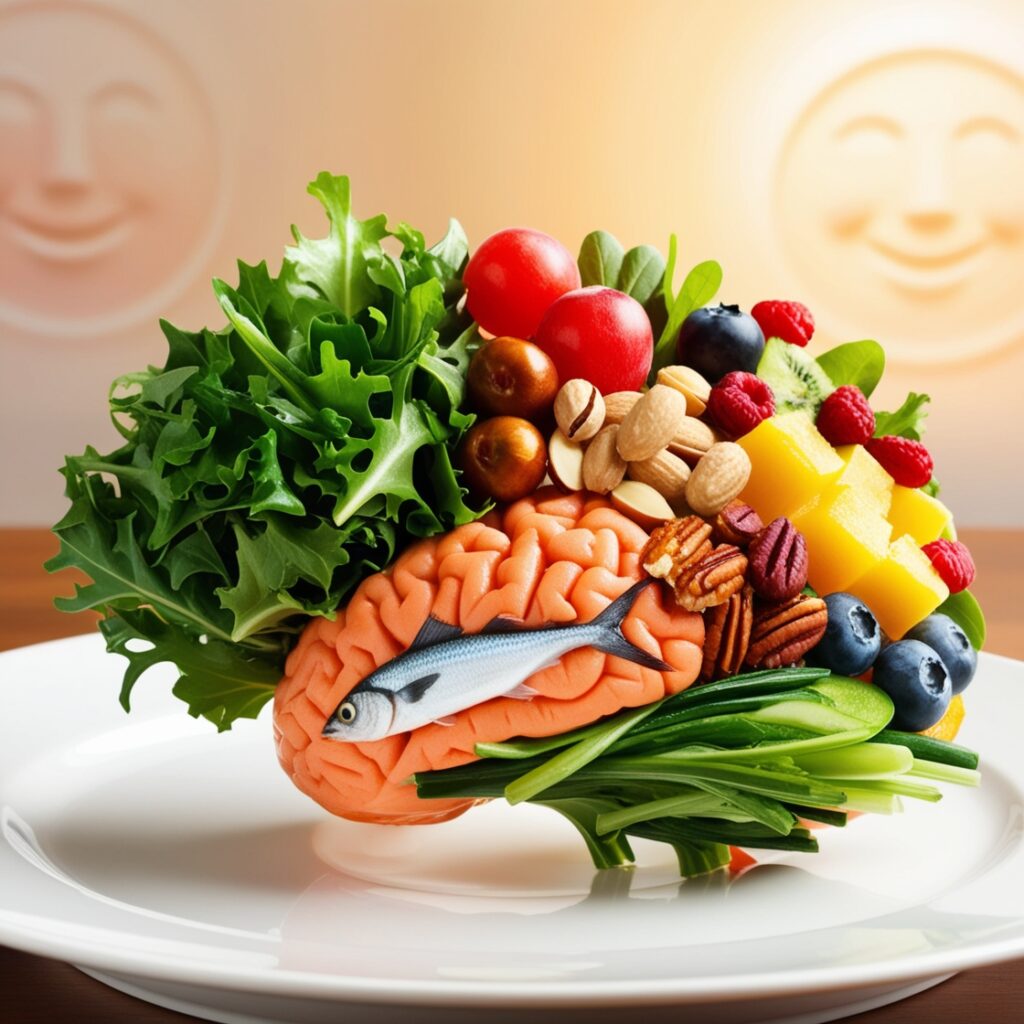The Impact of Healthy Eating on Mental Well-being
The Impact of Healthy Eating on Mental Well-being: Healthy eating is not only beneficial for physical health but also plays an essential role in mental well-being. Studies have shown that diet directly affects mood, memory, concentration, and overall mental health. When we fuel our bodies with nutrient-rich foods, we support both physical and mental balance. In this article, we will explore how certain nutrients in a healthy diet can positively impact mental health, improving emotional stability and mental clarity.
Nutrients that Benefit Mental Health
1. Omega-3 Fatty Acids and Brain Health
Omega-3 fatty acids, found in foods like fish, nuts, and seeds, are known for their positive effects on brain function. They help in building and repairing brain cells, which is crucial for cognitive function. Regular intake of omega-3s has been linked to reduced symptoms of depression and anxiety. People who consume these healthy fats often experience better mood stability, improved focus, and mental sharpness.
2. Balanced Blood Sugar and Mood
Stable blood sugar levels are crucial for maintaining steady energy and preventing mood swings. Foods high in refined sugars and simple carbs cause quick spikes and drops in blood sugar levels, which can lead to irritability, fatigue, and anxiety. On the other hand, complex carbohydrates like whole grains, fruits, and vegetables provide a slow and steady release of glucose. This stable energy supply helps to maintain a balanced mood throughout the day, supporting mental clarity and focus.
3. Protein for Neurotransmitter Support
Proteins are the building blocks of amino acids, which play an important role in neurotransmitter production. Neurotransmitters like serotonin and dopamine are chemicals responsible for mood regulation and feelings of well-being. Tryptophan, an amino acid found in protein-rich foods like turkey, chicken, eggs, and nuts, is necessary for producing serotonin. Including protein in your diet ensures that your brain has the necessary resources to regulate mood, reduce stress, and support a positive mental state.
4. B Vitamins and Cognitive Function
B vitamins, such as B6, B12, and folate, are essential for brain health and cognitive function. These vitamins contribute to the production of neurotransmitters and protect brain cells from damage. Deficiencies in B vitamins have been linked to symptoms of depression, irritability, and cognitive decline. Leafy greens, eggs, and whole grains are rich sources of B vitamins that support mental clarity, reduce fatigue, and enhance emotional well-being.
5. Magnesium for Stress Reduction
Magnesium is a vital mineral that plays a key role in regulating the body’s stress response. Found in foods like nuts, seeds, and leafy greens, magnesium helps to calm the nervous system and promotes relaxation. Many people have low levels of magnesium, which may contribute to feelings of anxiety, tension, and even poor sleep quality. Including magnesium-rich foods in your diet can reduce stress, improve sleep, and help you feel more relaxed.
6. Antioxidants for Mental Clarity
Antioxidants protect the brain from oxidative stress caused by free radicals, which can lead to mental fatigue and cognitive decline. Foods like berries, citrus fruits, and dark chocolate are rich in antioxidants that keep brain cells healthy and prevent damage. Studies suggest that people who eat antioxidant-rich foods experience less stress, improved memory, and enhanced mental clarity over time.
7. Fiber and the Gut-Brain Connection
The gut-brain connection is a vital aspect of how diet affects mental well-being. The gut is home to trillions of bacteria, which influence neurotransmitter production, particularly serotonin. A balanced gut microbiome supports mental health, while an imbalance has been linked to conditions like anxiety and depression. Fiber-rich foods such as fruits, vegetables, and whole grains help feed beneficial gut bacteria, promoting a healthy gut environment. Fermented foods like yogurt and kefir contain probiotics that further nourish the gut and can enhance mood and cognitive function.
The Psychological Benefits of Healthy Eating
Healthy eating not only nourishes the body but also provides psychological benefits. By choosing nutrient-dense foods, individuals often feel more energetic, less stressed, and better equipped to handle daily challenges. The simple act of eating well can build confidence, knowing that each meal supports both body and mind. In times of stress, individuals who follow a balanced diet can experience faster recovery and reduced symptoms of stress and anxiety.
Eating regular, balanced meals also creates a sense of routine and structure, which can positively affect mental well-being. With a well-rounded diet, the body and brain remain nourished, leading to improved focus, mental clarity, and a more balanced mood. In turn, these factors contribute to higher productivity, stronger relationships, and overall satisfaction in daily life.
Conclusion Incorporating a healthy diet into your lifestyle can have a profound impact on mental well-being. Nutrient-rich foods support brain function, mood stability, and stress management. By choosing whole foods, healthy fats, proteins, and complex carbohydrates, we give our minds the best possible support. Embracing healthy eating habits can lead to a happier, more focused, and emotionally balanced life. It’s clear that what we eat affects not only our bodies but also our minds, highlighting the powerful connection between diet and mental health.
See More


